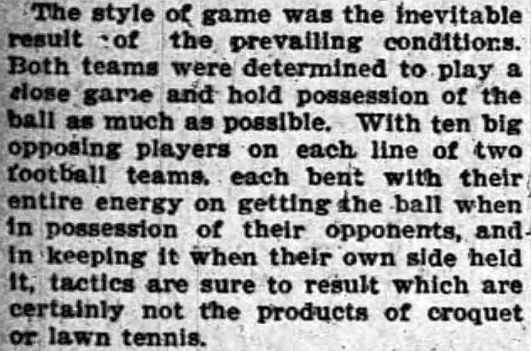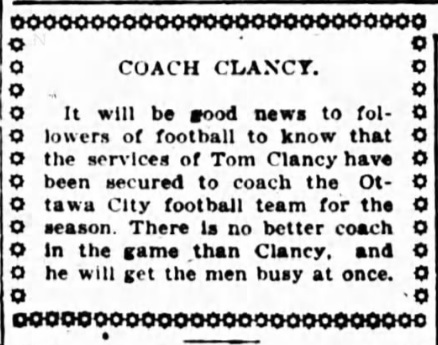The Ottawa City Football Club was kicked out of the Quebec Rugby Football Union in 1897 for rough play. If that didn't set the perception of the team being particularly...feisty...it must have at least cemented it.
What were they accused of, exactly? Let's have a look.
Ottawa's City team and Ottawa College, now the University of Ottawa, had a natural rivalry but things boiled up one November evening during one of their contests.
Before we go any further, let's have a basic line-up handy for quick reference when the injuries start piling up.
Officially, the game resulted in an 8-8 tie, though that score was disputed. The team that would become the Rough Riders felt that College was awarded a two-point safety when they actually had only earned a single point on the play, which would make the score 8-7 in favour of the city team.
But that wasn't even the controversial part!
It's not clear why Smellie was targeted. His name doesn't even come up in the Journal's summary of the first game between these two teams held on October 16th. I don't believe he played.
The Montreal Gazette also reported on the game, including an incident in which Walters of Ottawa struck an official.
But that wasn't even the controversial part!
It's not clear why Smellie was targeted. His name doesn't even come up in the Journal's summary of the first game between these two teams held on October 16th. I don't believe he played.
The Montreal Gazette also reported on the game, including an incident in which Walters of Ottawa struck an official.
It's easy to make a case for Walters to be suspended and even expelled from the league altogether, but the club as a whole? Consensus seemed to be, at least locally, that both clubs were equally responsible, especially since Ottawa's Smellie was assaulted within seconds of taking the field.
Accusations of rough play came from McGill as well, which is odd since there is actually no mention of any such incident in summaries of that game, played two weeks earlier, even in Montreal newspapers.
In that contest, McGill was ahead 18-01 in the second quarter. Ottawa came back and took a 20-19 lead. And yet, when the game had to be called due to darkness...It was declared to be a 19-19 draw. Go figure.
Accusations of rough play came from McGill as well, which is odd since there is actually no mention of any such incident in summaries of that game, played two weeks earlier, even in Montreal newspapers.
In that contest, McGill was ahead 18-01 in the second quarter. Ottawa came back and took a 20-19 lead. And yet, when the game had to be called due to darkness...It was declared to be a 19-19 draw. Go figure.
Back to the Ottawa City/College game, the QRFU heads agreed to meet the following Wednesday to discuss the events of that day. McGill, according to one report, wanted the Ottawa Club gone and failing that, they certainly didn't want to meet them again.
As one Ottawa newsman pointed out, Ottawa City's fate was in the hands of its accusers and all three voting clubs stood to benefit from voting a certain way.
And yet, that's precisely what happened. Walters was expelled from the Union and the City Club was suspended. No action was taken against College.
As one Ottawa newsman pointed out, Ottawa City's fate was in the hands of its accusers and all three voting clubs stood to benefit from voting a certain way.
Yeah, that worked out nicely for everyone...else. Ottawa City had already had the results of two its apparent victories turned into ties and yet was still comfortably at the top of the standings. Getting rid of them reset the race between the remaining three teams, so to speak.
The Montreal papers, for the most part, treated the result of the vote like unfortunate business that had to be done to send a valuable message that rough play would not be tolerated.
The Ottawa media was unsurprisingly upset at the suspension. The Ottawa Club was initially shocked but rather than fight the decision or attempt to retaliate, they appear to have just accepted the matter and looked towards the future. They would join the Ontario Union in 1898 rather than return to the QRFU.
Outside media were of the opinion that the ruling made the QRFU appear "ridiculous" (Toronto Star) and one-sided in avoiding punishment for Ottawa College when they were said by the game's referees to be equally guilty (Hamilton Spectator and Hamilton Times).
A year later, the Hamilton Herald would refer to them as thugs and murderers. 😁 Life came at you fast in 1898 too!
The Montreal papers, for the most part, treated the result of the vote like unfortunate business that had to be done to send a valuable message that rough play would not be tolerated.
The Ottawa media was unsurprisingly upset at the suspension. The Ottawa Club was initially shocked but rather than fight the decision or attempt to retaliate, they appear to have just accepted the matter and looked towards the future. They would join the Ontario Union in 1898 rather than return to the QRFU.
Outside media were of the opinion that the ruling made the QRFU appear "ridiculous" (Toronto Star) and one-sided in avoiding punishment for Ottawa College when they were said by the game's referees to be equally guilty (Hamilton Spectator and Hamilton Times).
A year later, the Hamilton Herald would refer to them as thugs and murderers. 😁 Life came at you fast in 1898 too!






















